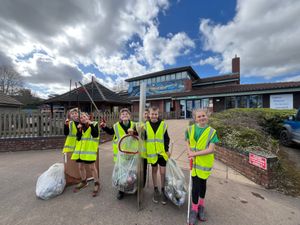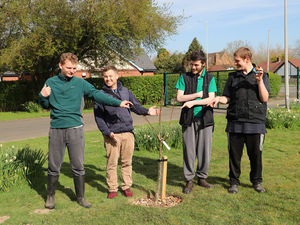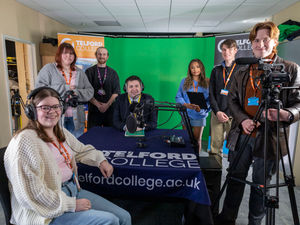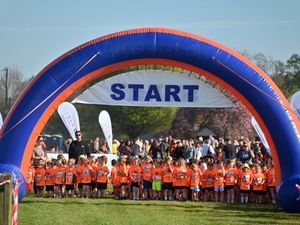Maggie Philbin in Telford: Former Swap Shop star swaps TV for helping teens
Maggie Philbin is surrounded by a group of excited teenagers from Madeley Academy, as a hi-tech 3D printing machine starts spraying liquid vinyl on to a metal plate to create a decorative wristband.
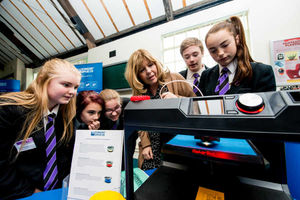
"This is the best thing I've ever done," she beams. "Even better than Swap Shop."
Even better than Swap Shop? That is praise indeed. Back in the late 1970s millions of children would spend every Saturday morning glued to this curious mix of phone-ins, current affairs for children and pop music, and of course the Swaparama outside broadcasts where Maggie and her future husband Keith Chegwin would meet children wanting to swap their toys.
"I think we came to Ironbridge for one of them," she recalls. "It was a great time, we were a very close-knit team."
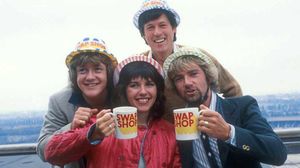
Now 61, Maggie cuts a far more authoritative figure than the slender twenty-something who led to many dads taking an unusual interest in their children's viewing. But while the youngsters aged 12-14 are far too young to remember the BBC's slightly more mature rival for Tiswas, they still hang on her every word.
Maggie, who went on to present Tomorrow's World, is at Telford's Enginuity museum for a day-long TeenTech event which encourages children to take in interest in the careers that are available in science and technology. A total of 260 youngsters from 25 schools across Telford & Wrekin, plus one in Wolverhampton, are challenged to come up with ideas for a new mobile phone application, which will make life easier or more fun.
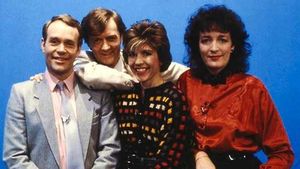
There are also a series of stands highlighting the careers available in science and technology, including the 3D printing machine which has been wowing the youngsters.
Maggie says she first had the idea of doing something to encourage youngsters into technology while watching the construction of the Olympic Village in London.
"It was standing on a Hackney rooftop in 2007, looking across at the bulldozers glinting in the December sunshine, that I recognised a powerful opportunity to enthuse young people, not only about sport but science, engineering, construction and technology," she says.
"When I held my first TeenTech event in 2008, the impact it had was there for all to see, the way it made them realise that technology might be something for them.
"I wish we had something like TeenTech when I was at school."
Nobody can question her commitment to the cause. When she founded the organisation eight years ago, she was enjoying that rarest of luxuries in the broadcasting industry – a staff contract offering a regular salary.
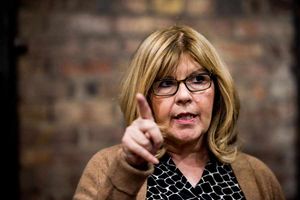
"I was working five days a week, but once TeenTech became established, I had to ask for it to be cut down to four, then three, then eventually I had to have a really frank discussion with the BBC and say 'really, I need to be doing this full-time'."
She says the important thing about the TeenTech events is that they are aimed at children of all abilities and backgrounds.
"At the start we ask them to take a vote on how interested in science and technology they are," she says. "We then do it at the end to see how it has changed their mind.
"We did one in London recently where only 22 per cent of the girls said they were either 'interested' or 'fairly interested', but by the end it was 75 per cent."
Does her background as a children's TV presenter help her communicate with the young generation?
"I think being a mum to my daughter probably helped more," she says.
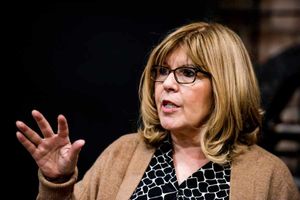
"I think being on Tomorrow's World did, because you have got three minutes to explain something."
She adds: "A lot of young people might say they are not interested in science or technology, but they are interested in fashion or football.
"So you then show them how digital technology has revolutionised what the fashion industry, how their local football team is using technology to improve its performance, and then they become interested. Technology is about people, not widgets."
It is 40 years this month since Multi-Coloured Swap Shop first appeared on our screens. Indeed, it could be said that the name of the show was a reference to how technology was transforming the world of entertainment, as it was broadcast in full colour, although many of its young viewers would have still be watching on black-and-white sets.
But the milestone seems to have, so far at least, gone unnoticed by the BBC, which 10 years ago marked the 30th anniversary with a reunion of presenters Noel Edmonds, John Craven, Maggie and Keith.
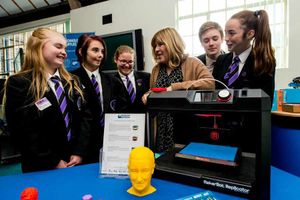
"To be honest, I only realised it was the anniversary because I had seen it on Twitter," says Maggie.
"I think the problem was, like it was for the 30th anniversary, that there is not much archive footage around."
The programme was always broadcast live, and the only recordings were made on the 90-minute 'Quad' tapes. While these tapes were already considered antiquated at the time, they were still regularly used by Australian broadcasters, and once they were considered surplus to requirements, they were sent down under to be reused.
As a child, Maggie had dreamed of being a vet, but struggled with chemistry at school and ended up studying drama at Manchester University. She joined the Swap Shop team in 1978, straight after graduation.
"I applied for the job while I was finishing my degree at Manchester, and was going through the auditions at the same time as sitting my finals," she recalls.
"I've been very blessed in the opportunities that I have been presented with."

